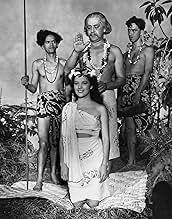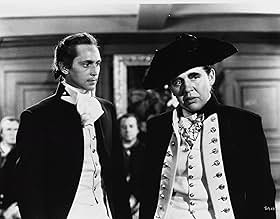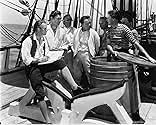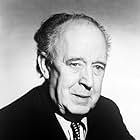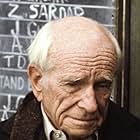Le premier lieutenant Fletcher Christian mène une révolte contre son commandant sadique, le capitaine Bligh, dans cette aventure maritime classique, basée sur la véritable mutinerie de 1788.Le premier lieutenant Fletcher Christian mène une révolte contre son commandant sadique, le capitaine Bligh, dans cette aventure maritime classique, basée sur la véritable mutinerie de 1788.Le premier lieutenant Fletcher Christian mène une révolte contre son commandant sadique, le capitaine Bligh, dans cette aventure maritime classique, basée sur la véritable mutinerie de 1788.
- Réalisation
- Scénario
- Casting principal
- Récompensé par 1 Oscar
- 8 victoires et 7 nominations au total
- Maimiti
- (as Mamo)
Résumé
Avis à la une
All three leads Clark Gable, Charles Laughton, and Franchot Tone were nominated for Best Actor that year and they managed to cancel each other out. Victor McLaglen took home the statue for The Informer with the fifth nominee being Paul Muni for Black Fury.
Clark Gable wisely did not attempt a British accent and yet there was no criticism of his performance as Fletcher Christian. Christian was first mate of the HMS Bounty and a man of conscience. It tears him up inside to see the sadism and cruelty of Captain Bligh on this voyage. The men aren't king and country volunteers as he tells the captain. But the captain has his own ideas.
Normally Charles Laughton played a whole lot of twisted and/or tortured souls for the screen. His Captain Bligh is a man with a deep inferiority complex. The key to him is in the dinner scene on board the Bounty. Watching him, you can see the envy and jealousy he has of the confident and self assured Gable, the callow youth Franchot Tone brimming with idealism and even the surgeon Dudley Digges who despite his drunkeness and crudity is a professional man with some education. It's so much like James Cagney's captain in Mister Roberts and worse because at that time the British Navy gave him the authority of God on that ship.
The conflict between Gable and Laughton is obviously the main plot of the film. Yet there is a subplot that's rarely talked about, the conflict between Gable and Franchot Tone. Tone who was also American, but was stage trained and could fit into a British setting easily, plays Roger Byam one of the young midshipmen on board and who Gable befriends. The key to his character is right at the beginning of the film when he's being sent off to sea by Henry Stephenson playing Sir Joseph Banks. Seven generations of Byam's family have been part of the glorious naval tradition of Great Britain and none have failed in their duty. That should be uppermost in your mind.
Gable and Tone have different ideas of duty and it tests their friendship. Each chooses a different path, yet Tone ends up defending Gable against Laughton. Franchot Tone's finest screen moment for me has always been at his court martial where he makes a stirring speech in defense of the rights of the ordinary British seaman.
As always though the mark of a really great film is the impact those small character roles leave. The men on the Bounty include Donald Crisp, Stanley Fields, Eddie Quillan, Herbert Mundin. My favorite though is Dudley Digges as the ship's surgeon Mr. Bacchus. At the drop of a shilling he'll tell you how he's lost his leg. Outrageous, humorous, and a kindly man who softens the blows of Laughton's harsh discipline, had there been the Supporting player categories then, Mr. Digges would have been my choice for 1935 as Best Supporting Actor.
Even in black and white, made in the studio back lot, Mutiny on the Bounty still holds up well today. Despite two subsequent versions of the story, this version has stood the test of time.
The single most obvious among these is the star power involved: led by two Oscar-winning stars, the critically formidable Charles Laughton and the incredibly popular Clark Gable, the cast reads like a Who's Who of mid-1930s male actors ranging from leading man Franchot Tone to the memorable character actor Donald Crisp. In a visual sense, the film is also a knockout: filmed on location in a full-size replica of the Bounty, it set a new standard for capturing the sea on film. And the story itself is powerful, the tale of the battle between the cruel and autocratic Bligh and the humane and populist Fletcher Christian. Taken together, it makes for a powerful ride.
Still, some viewers may not find MUTINY ON THE BOUNTY all it is cracked to be. Then as now, Hollywood was less interested in getting the facts right than in telling a good story--and from a factual point of view the film is perhaps twenty percent accurate and eighty percent nothing more nor less than historical tarradiddle. That is no real hindrance per se; after all, we're not watching a documentary. But seen from a modern standpoint the cast now feels somewhat problematic.
Charles Laughton was so critically well regarded that he received star billing over Clark Gable for the film, and seen today his performance is easily the single most powerful in the entire film. Autocratic, brilliant, and immediately and increasingly unlikable, he drives the film from start to finish--and it is here, really, in which most of the film's historical accuracy resides. The rest of the cast, however, is extremely Hollywood. Clark Gable, Franchot Tone and all the rest give an excellent show, full of power and drive--but you never for a moment forget that they are indeed Hollywood stars and not members of the British Navy.
This is very much a "big" film in the MGM tradition, often brilliant, often memorable, and often setting new standards for the motion picture industry. And when regarded from that point of view it is extremely, extremely entertaining. But it may also be a film whose power has slightly faded with the passing of time.
Gary F. Taylor, aka GFT, Amazon Reviewer
The trio of Charles Laughton, Clark Gable, and Franchot Tone set a standard that none of the rest could come close to equaling. Laughton is perfect as Bligh, or at least as the kind of captain that Bligh is/was commonly assumed to have been. Gable does very well in adapting Fletcher Christian just enough to fit his own strengths - Gable is not quite what you expect of a British naval officer, but if he had tried to force himself into that mold, it probably would have been rather unconvincing. In themselves, Gable's charisma, decisiveness, and energetic personality seem just right for Christian. Tone also fits smoothly into the role of Byam, giving it the right combination of earnestness and restraint.
Their performances are set off nicely by the carefully detailed and interesting settings, and by a supporting cast that gets its share of good moments. The historical truths of the Bounty incident can be fairly debated, since it's unlikely that anyone now knows the inside story. But setting aside those questions, and purely as a movie, it would be hard to argue the virtues of this version of the story.
Charles Laughton is sublime.
If one wants to see the story from Bligh's side, read his very readable account THE MUTINY ABOARD H.M.S. BOUNTY, but keep in mind that it is his account of his side of the story. Christian never did get a chance to produce his side of it. Peter Heyward, the real life version of Byams (Franchot Tone) had the family connections and money to publish his anti-Bligh account, but Bligh's book became a best seller.
Historically most people feel that Bligh was more bark than bite. Unfortunately for his reputation he would be involved (in later years) in two other mutinies: that of the entire British fleet (the "Great Mutiny of 1797), where his ship "H.M.S. Director" was the last ship to take down it's flag of mutiny); and the New South Wales mutiny of 1805, where he was the Governor of the colony and his measures led to a mutiny of the local New South Wales Corp. But the Great Mutiny was actually caused by government corruption and neglect of it's seamen. As for the 1805 mutiny, Bligh was trying to control the New South Wales Corps which was not only corrupt but bullying the civilians. In the end his reports led to the recall of the corp. to fight against Napoleon on the Iberian Peninsula. But Nordhoff and Hall presented Bligh as the villain there too.
The film also has more to it than the ranting of Bligh at "MR. Christian!" There are moments of comedy. Laughton's temper and anger are punctured a few times when the new cook (Herbert Mundin) keeps bungling things. When Laughton is angrily confronting a dissatisfied sailor, he happens to be staring directly at the sailor and Mundin. He orders the sailor to step forward, but Mundin does, causing Laughton to sputter. Also Mundin manages to toss garbage over the side so that it ends up hitting Laughton in the face. One wishes there had been more than this, or (better than that) an attempt to bring the two actors together in a comedy. Add to this Mr. Bacchus (Dudley Digges) whose leg (depending on when he is talking about it) was lost in a sea battle with the French, by a shark (who six months later turned up dead, with the leg still inside him), and shot off by a pirate off Madagascar (or something like that). His death in the film is a signal for the collapse of the one spot of humanity linking Christian's faction with Bligh's.
It is now generally accepted that Bligh was one of the greatest navigators in history, and the open boat voyage after being thrown off the Bounty remains an incredible achievement (he lost only two men). The film's best moments for Laughton is in this section, as he suddenly becomes far more wiser and humane trying to keep his crew healthy and able to continue to sail to safety. But when in charge of a full ship Bligh could not, or would not control his temper and his tongue. It was sufficient to get him into trouble. However, it was also his ticket to fame. Seaman remember the great navigator and the cartographer - the man who sailed with Captain Cook and who fought (at Copenhagen in 1801) next to Horatio Nelson. But the public will always remember the ill-tempered martinet, fairly or not, whose tongue made nautical history.
Oscars Best Picture Winners, Ranked
Oscars Best Picture Winners, Ranked
Le saviez-vous
- AnecdotesActor James Cagney was sailing his boat off of Catalina Island, California, and passed the area where the film's crew was shooting aboard the Bounty replica. Cagney called to director Frank Lloyd, an old friend, and said that he was on vacation and could use a couple of bucks, and asked if Lloyd had any work for him. Lloyd put him into a sailor's uniform, and Cagney spent the rest of the day as an extra playing a sailor aboard the Bounty. Cagney is clearly visible near the beginning of the movie.
- GaffesThe portrayal of the mutiny shows loyalists and mutineers battling and killing one another on deck. This is false. When Christian took the Bounty it occurred at night where most of the crew were captured in their hammocks. The only person who struggled was Bligh himself.
- Citations
[Byam enters the courtroom and sees that the midshipman's dirk on the table points toward him; he knows that he has been condemned to death]
Lord Hood: Have you anything to say before the sentence of this court is passed upon you?
[long pause]
Byam: Milord, much as I desire to live, I'm not afraid to die. Since I first sailed on the Bounty over four years ago, I've know how men can be made to suffer worse things than death, cruelly, beyond duty, beyond necessity.
[turns to Captain Bligh]
Byam: Captain Bligh, you've told your story of mutiny on the Bounty, how men plotted against you, seized your ship, cast you adrift in an open boat, a great venture in science brought to nothing, two British ships lost. But there's another story, Captain Bligh, of ten cocoanuts and two cheeses. A story of a man who robbed his seamen, cursed them, flogged them, not to punish but to break their spirit. A story of greed and tyranny, and of anger against it, of what it cost.
[turns to Lord Hood]
Byam: One man, milord, would not endure such tyranny.
[turns again to Captain Bligh]
Byam: That's why you hounded him. That's why you hate him, hate his friends. And that's why you're beaten. Fletcher Christian's still free.
[back to Lord Hood]
Byam: Christian lost, too, milord. God knows he's judged himself more harshly than you could judge him.
[turns to Fletcher Christian's father]
Byam: I say to his father, "He was my friend. No finer man ever lived."
[addresses the court again]
Byam: I don't try to justify his crime, his mutiny, but I condemn the tyranny that drove 'im to it. I don't speak here for myself alone or for these men you condemn. I speak in their names, in Fletcher Christian's name, for all men at sea. These men don't ask for comfort. They don't ask for safety. If they could speak to you they'd say, "Let us choose to do our duty willingly, not the choice of a slave, but the choice of free Englishmen." They ask only the freedom that England expects for every man. If one man among you believe that - *one man* - he could command the fleets of England, He could sweep the seas for England. If he called his men to their duty not by flaying their backs, but by lifting their hearts... their... That's all.
- Versions alternativesAlso available in a computer colorized version.
- ConnexionsEdited into The Extraordinary Seaman (1969)
Meilleurs choix
Détails
- Date de sortie
- Pays d’origine
- Langues
- Aussi connu sous le nom de
- Motín a bordo
- Lieux de tournage
- Tahiti, Polynésie Française(second unit photography)
- Société de production
- Voir plus de crédits d'entreprise sur IMDbPro
Box-office
- Budget
- 1 950 000 $US (estimé)
- Montant brut mondial
- 4 901 $US
- Durée2 heures 12 minutes
- Couleur
- Rapport de forme
- 1.37 : 1
Contribuer à cette page



